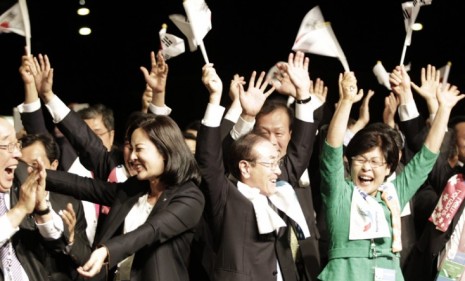South Korea's successful 2018 Olympics bid: Winners and losers
The city of Pyeongchang scores hosting duties for the 2018 Winter Games. Who benefits from that victory, and who gets burned?

A free daily email with the biggest news stories of the day – and the best features from TheWeek.com
You are now subscribed
Your newsletter sign-up was successful
On Wednesday, the South Korean city of Pyeongchang won its bid for the 2018 Winter Olympics, beating out Munich, Germany, and Annecy, France, for the hosting honors. After narrowly losing bids for the 2010 and 2014 Winter Games, Pyeongchang received 63 out 95 International Olympic Committee votes in a decisive first-round victory. What does the winning bid, which will bring a Winter Olympics to continental Asia for the first time, mean for Korea, and the rest of the world? Here, a breakdown of the winners and losers:
WINNERS
South Korea's economy
The Week
Escape your echo chamber. Get the facts behind the news, plus analysis from multiple perspectives.

Sign up for The Week's Free Newsletters
From our morning news briefing to a weekly Good News Newsletter, get the best of The Week delivered directly to your inbox.
From our morning news briefing to a weekly Good News Newsletter, get the best of The Week delivered directly to your inbox.
According to the Korean Institute for Industrial Economics and Trade, the Olympics could bring in as much as $27 billion, while the Hyundai Research Institute estimates that it will inject $61 billion into the economy, factoring in investments, spending, and increased consumption. In Thursday trading, shares in South Korean construction firms and resort companies surged by as much as 15 percent.
South Korea's global image
"In Europeans' minds, Korea could be simply perceived as a country with a strong high-tech and information technology industry," says analyst Lee Dong-hun, as quoted by The Korea Times. "Korea's media exposure as a nation hosting the global winter sports event will help give Europeans a positive perception," showing that Korea isn't just a tech giant, but also a country with high-end winter sports facilities suitable for luxury travel.
South Korean President Lee Myung-bak
A free daily email with the biggest news stories of the day – and the best features from TheWeek.com
He might be "the greatest benefactor," says In-Soo Nam in The Wall Street Journal. The president's popularity has been on the decline following a number of scandals. "Will the Pyeongchang Olympics be able to restore the high approval ratings he enjoyed after his country hosted the G-20 summit last year? We'll see."
"This is a day for both South and North Korea," says Unification Minister Hyun In-taek, as quoted by Reuters. Indeed, there's hope that the Olympics could encourage better relations between the adversarial Koreas, which have technically remained at war for decades.
Persistence
"The victory margin was massive and the message loud and clear: Persistence paid off for South Korea in its third consecutive bid for the Winter Olympics," says Stephen Wilson for the Associated Press. The country had suffered "two stinging defeats" previously, but it pressed on to finally, and decisively, win the bid.
LOSERS
Europe
South Korea's victory over Germany and France is part "a growing trend for major sports events," says Paul Radford at Reuters. Recent Summer Games have gone to Beijing and Rio de Janeiro — both firsts for their respective countries. Last year's World Cup was in South Africa, and in 2022 it will be in Qatar. These high-profile events are continuing to shift away from European dominance.
NBC
"At NBC Universal, the choice of venue is more likely to have elicited groans," says Marc E. Babej at Forbes. The network paid $2.38 billion for the rights to the 2018 and 2020 games, before the venues were decided. With the 14-hour time difference between Pyeongchang and America's east coast, it could lose a lot of money, as popular events are unlikely to take place during America's prime time. "NBC's best bet is to address the problem at its root: By weighing on the organizers to schedule more events during late mornings, Korean time."
Katarina Witt
Germans are taking the defeat especially hard. In Munich, thousands had gathered in Marienplatz for the announcement, and what they hoped would be good news. Munich bid chief and two-time Olympic figure-skating champion Katarina Witt reportedly had to be ushered away to regain her composure after the announcement. "At the moment, I am at a loss for words," she later said. "Obviously, we are bitterly disappointed."
-
 Political cartoons for February 16
Political cartoons for February 16Cartoons Monday’s political cartoons include President's Day, a valentine from the Epstein files, and more
-
 Regent Hong Kong: a tranquil haven with a prime waterfront spot
Regent Hong Kong: a tranquil haven with a prime waterfront spotThe Week Recommends The trendy hotel recently underwent an extensive two-year revamp
-
 The problem with diagnosing profound autism
The problem with diagnosing profound autismThe Explainer Experts are reconsidering the idea of autism as a spectrum, which could impact diagnoses and policy making for the condition